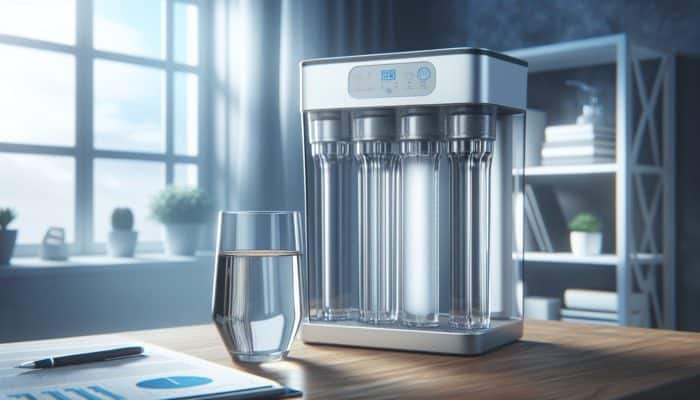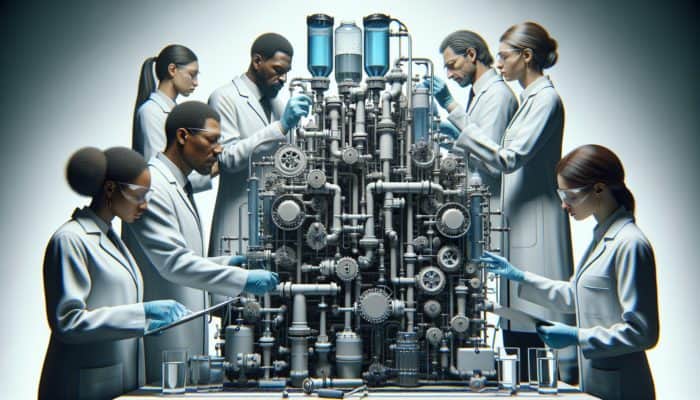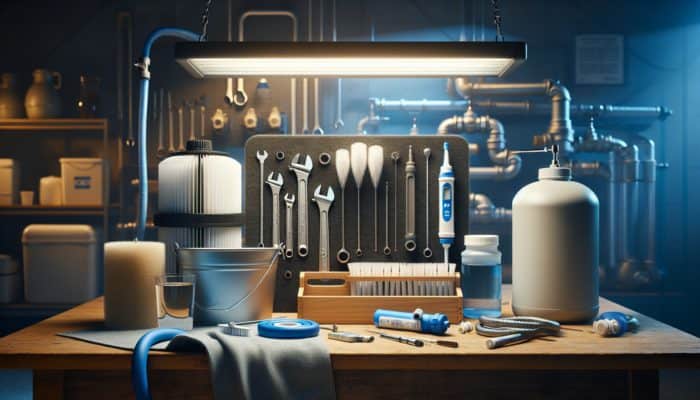Understanding the Importance of Regular Water Filter Maintenance
Why is Regular Maintenance Crucial for the Performance of Water Filters?

Maintaining your water filter is essential for ensuring the health and efficiency of your home. Regular maintenance is not merely a suggestion; it is vital for ensuring that your filter performs optimally, prolongs its lifespan, and guarantees the purity and safety of the water you drink. Here are several key benefits of making consistent maintenance a priority:
- Improved Water Quality: Regular maintenance effectively removes harmful contaminants, ensuring you have access to safer drinking water.
- Extended Lifespan: Filters that are well-maintained last longer, saving you money on replacements.
- Cost Savings: Routine maintenance helps prevent expensive repairs or replacements down the line.
- Maximized Efficiency: Filters work best when regularly serviced, leading to superior filtration results.
- Peace of Mind Regarding Water Safety: Knowing your water is clean and safe enhances your household’s sense of security.
Focusing on the longevity of your water filter is not just about saving money; it involves creating a healthy living environment for you and your family. Neglecting maintenance can compromise the filter’s effectiveness, which may lead to health risks due to the unchecked accumulation of contaminants.
How Does Regular Maintenance Contribute to Enhanced Water Quality?
The relationship between consistent maintenance and water quality is both clear and important. When filters are ignored, they can become obstructed with sediment, leading to reduced flow rates and ineffective filtration. This added pressure can also cause the filter material to break down, allowing dangerous substances to slip through. It is crucial to carry out routine inspections and maintenance to ensure that your water stays clear of harmful bacteria, heavy metals, and various pollutants.
A clear example can be seen in communities relying on well water. Such areas often face unique contamination issues, such as elevated levels of nitrates and heavy metals. Without regular maintenance, a water filter can quickly lose its effectiveness, resulting in serious health consequences. This highlights the need for consistent checks and timely filter replacements to ensure that the water from your tap is clean and safe for consumption.
Why is Regular Maintenance an Economical Approach?
Regular maintenance of your water filters is a smart financial decision. While the costs associated with replacing filters or hiring professionals may seem like a burden, neglecting routine upkeep can lead to much higher expenses over time. Filters that are not properly maintained are more prone to failure, requiring costly repairs or even a complete system replacement, which can significantly impact your finances.
For example, a simple cleaning of a carbon filter may only cost a small amount and require minimal time, but failing to take care of this task could lead to system failure with potential expenses soaring into hundreds of pounds. By investing a little time and money now, you can avoid significant costs later. Furthermore, a well-maintained water filter operates more efficiently, using less energy and providing clean water without the need for expensive bottled alternatives.
Expert Insights on Effective Water Filter Maintenance

What Are the Best Practices for Keeping a Water Filter in Top Condition?
<pEffective maintenance of a water filter involves a combination of meticulous attention to detail and adherence to best practices. Experts suggest several optimal strategies to ensure your filtration system operates efficiently. These practices not only protect the quality of your water supply but also extend the life of your filter.
One highly effective strategy is to perform a *monthly visual inspection*. This includes checking for leaks or signs of wear and tear. Additionally, it is crucial to *replace filters based on the manufacturer’s recommendations*, typically suggesting changes every 6 to 12 months, depending on usage. In situations of high demand, such as in families with multiple members or in areas with heavy sediment, filters may need to be replaced more frequently.
Another recommended practice is to *flush your system regularly*, which involves running water through the filter for a few minutes to clear any accumulated debris. Other best practices include maintaining a log of maintenance activities, using only manufacturer-recommended replacement parts, and ensuring that the installation area remains clean and free of contaminants. By following these practices, you can greatly improve the performance of your filter.
How Often Should Maintenance Be Performed on Water Filters?
The frequency of water filter maintenance can vary significantly based on factors such as filter type, water quality, and usage rates. Experts recommend establishing a maintenance schedule tailored to your specific needs. For example, if you live in an area with hard water or high sediment levels, you may need to conduct maintenance more often than the standard guidelines suggest.
For traditional activated carbon filters, a good rule of thumb is to replace them every 6 months, while reverse osmosis systems may require more extensive checks every 2 years. To determine the right frequency, evaluate your water usage patterns. If you notice reduced flow or unusual tastes, it could indicate that maintenance is overdue. Always refer to the manufacturer's recommendations as your primary guideline and adjust your schedule based on your observations.
What Essential Tools Are Required for Effective Water Filter Maintenance?

Having the appropriate tools is crucial for effective water filter maintenance. A well-stocked toolkit not only simplifies the tasks at hand but also enhances their effectiveness. Essential tools include:
- Wrench: A filter wrench is necessary for opening filter housings without causing damage.
- Cleaning Brushes: Soft brushes are ideal for dislodging accumulated sediment without harming filter materials.
- Bucket: A bucket is essential for managing spills during filter changes.
- Hoses: Hoses are helpful for efficiently flushing out filters and systems.
- pH Test Strips: These are useful for checking the pH level of your water before and after filtration.
Investing in a reliable toolkit not only prepares you for routine maintenance but also equips you to address unexpected issues that may surface. By pairing these tools with a fundamental understanding of how your filter operates, you will be well on your way to mastering water filter maintenance.
What Common Challenges Are Encountered During Water Filter Maintenance?
While essential, water filter maintenance can present various challenges that even experienced DIY enthusiasts may face. One of the most prevalent issues is *clogging*. Over time, filters can saturate with contaminants, resulting in decreased flow rates. This challenge necessitates regular checks and a clear understanding of when to replace the filter.
Another common issue is *leakage*. Filters that are not appropriately fitted can leak, jeopardizing both the filter’s performance and your home. This often arises from improper installation or the deterioration of seals over time. To combat this challenge, ensure that seals are routinely examined and replaced as necessary.
Lastly, keeping track of maintenance schedules can be daunting for many users. Without a proper log, it is easy to forget when filters need replacing or when the last maintenance check occurred. Utilizing apps or simple journals can help keep these tasks organized, ensuring your water remains clean and your filter operates efficiently.
How Does Consistent Maintenance Impact Filter Performance?
Regular maintenance significantly influences the performance of your water filter. Filters that are routinely cleaned and serviced operate at higher efficiencies, which directly correlates with the quality of water produced. Neglecting maintenance can lead to a gradual decline in performance, ultimately rendering the filter ineffective in removing contaminants.
For instance, research on residential water filtration systems indicates that filters subjected to regular maintenance can eliminate up to 99% of harmful bacteria. In contrast, poorly maintained filters struggle to achieve even a 50% efficiency rate. This stark difference underscores how a few simple maintenance practices can protect your health and ensure the water you consume remains safe.
By engaging in proactive care, you are essentially investing in the longevity and effectiveness of your filtration system. This not only safeguards the quality of your drinking water but also prevents more significant issues and costs in the future.
Recognizing Common Water Filter Problems and Solutions
What Are the Most Common Issues with Water Filters?
Identifying frequent water filter problems is the first step towards effective maintenance. Numerous issues can arise, often manifesting as changes in water quality or flow. Here are several common problems and their indicators:
- Reduced Water Flow: A noticeable drop in flow rate often suggests a clogged filter.
- Strange Tastes or Odours: Unusual tastes may indicate filter saturation or contamination.
- Cloudy Water: Cloudiness may suggest that the filter is not effectively removing particulates.
- Leaks: Water pooling around the filter housing can indicate improper sealing or a damaged filter.
- Increased Pressure: Higher-than-normal pressure readings may indicate a blockage or malfunction.
Being vigilant and observant of these signs is critical. By identifying issues early, you can mitigate potential health risks and ensure your water filter continues to operate effectively.
How Can You Address Common Water Filter Issues?
Many common water filter problems can be resolved with simple do-it-yourself (DIY) solutions. For example, if you are experiencing reduced water flow, start by unclogging the filter. This often involves removing and thoroughly cleaning it. For many types of activated carbon filters, a gentle rinse under running water can yield significant improvements.
If you detect unusual tastes, consider replacing the filter entirely if cleaning does not resolve the issue. It is vital to follow the manufacturer’s guidelines for replacements. For leaks, closely inspect all fittings and seals—tightening loose connections or replacing worn seals typically resolves the problem.
If cloudy water persists, it may indicate that the filter is no longer effective, prompting the need for replacement. Addressing these issues quickly can prevent further complications and maintain the integrity of your water source.
When Should You Seek Professional Assistance for Water Filter Issues?
While many water filter maintenance tasks can be carried out independently, recognizing when to seek professional help is essential. If you encounter persistent problems after performing basic maintenance, such as ongoing leaks or if flow rates do not improve with cleaning, it’s advisable to consult an expert.
Furthermore, if your filter system is complex, such as a reverse osmosis or ultraviolet filtration system, professional assistance may be necessary for proper maintenance and troubleshooting. These systems require specialized knowledge that may exceed typical DIY capabilities.
Finally, when in doubt, do not hesitate to reach out to a professional. They can provide a thorough evaluation of your system, ensuring it operates efficiently and safely. Professional inspections can reveal hidden issues that might otherwise go unnoticed, ultimately ensuring that your water quality remains uncompromised.
Effective Preventive Maintenance Strategies for Water Filters
Establishing a routine for preventive maintenance can significantly reduce the occurrence of common issues. Here is a checklist of tasks to integrate into your maintenance routine:
- Monthly Inspections: Check for leaks, cracks, or visible wear.
- Filter Changes: Follow the manufacturer's schedule for filter replacements.
- System Flushing: Flush the system monthly to prevent buildup.
- Component Cleaning: Regularly clean any components that can harbor bacteria.
- Record Keeping: Maintain a log of maintenance activities and filter changes.
Incorporating these preventive measures will help keep your water filter functioning smoothly while ensuring the high quality of your drinking water remains intact. This proactive approach pays off in the long term, benefiting both your health and your finances.
Understanding Filter Lifespan and When to Replace Them
Knowing when to replace your water filter is crucial for maintaining clean water. Filter lifespans can vary widely based on filter type and usage patterns. For instance, activated carbon filters usually last between 6 and 12 months, while reverse osmosis membranes can last anywhere from 2 to 5 years, depending on water quality and usage.
Signs that indicate a replacement is necessary include visible discoloration, strange tastes or odours, and inadequate flow rates. Understanding these lifespans and their associated signs ensures you do not accidentally compromise your water quality by delaying essential replacements. Regular checks and timely replacements can significantly enhance the purity of your water.
Exploring Different Types of Water Filters and Their Maintenance Requirements
What Are the Different Types of Water Filters Available?
Understanding the various types of water filters is key to effective maintenance. The most common types include activated carbon filters, reverse osmosis systems, and UV purification systems, each with unique maintenance needs.
Activated carbon filters are excellent at removing chlorine, sediment, and volatile organic compounds. However, they require regular replacement and cleaning to perform optimally. Reverse osmosis systems, on the other hand, eliminate a broader range of contaminants, including heavy metals and salts, but necessitate periodic checks and membrane replacements. UV systems excel at disinfecting water without chemicals, but their lamps must be replaced annually to maintain effectiveness.
By familiarizing yourself with the specific type of filter you own, you can tailor your maintenance practices accordingly, ensuring optimal performance and longevity.
Key Maintenance Practices for Activated Carbon Filters
Activated carbon filters are popular for their ability to enhance water taste by removing harmful chemicals and impurities. Regular maintenance is essential to ensure they function effectively. These filters typically require replacement every 6 to 12 months, depending on the contaminant levels in your water.
Cleaning the filter housing periodically is also crucial. Rinsing it out and checking for any buildup can help prevent clogging. If you notice a decline in water flow or experience unusual tastes, it’s time to inspect or replace the filter. Additionally, always store the carbon itself in a dry, cool place to maintain its effectiveness.
Using filtered water exclusively for drinking and cooking can also help extend the lifespan of the activated carbon filter, as it reduces the workload on the filter, allowing it to operate efficiently for longer periods.
Maintenance Recommendations for Reverse Osmosis Systems
Reverse osmosis systems represent some of the most advanced water filtration systems available. They provide thorough filtration, but their maintenance requirements are specific and must be followed closely for optimal performance. The membranes in these systems typically need replacement every 2 to 5 years, depending on usage and water quality.
Regularly checking and replacing pre-filters and post-filters is equally important. These filters protect the reverse osmosis membrane and should be changed every 6 to 12 months. Furthermore, periodic sanitization of the system is recommended to prevent bacterial growth.
Monitoring water pressure is another vital aspect of maintaining these systems. If you notice a drop in pressure, it may indicate a clogged pre-filter or the need for membrane replacement. By keeping up with these tasks, you can guarantee that your reverse osmosis system continues to provide high-quality water for years.
Steps for Cleaning and Replacing Water Filter Components
What is the Proper Procedure for Cleaning a Water Filter?
Cleaning your water filter is essential for maintaining its performance and extending its lifespan. Here are the general steps to follow for cleaning various types of filters:
- Shut Off Water Supply: Begin by turning off the water supply to prevent spills during the process.
- Remove Filter: Carefully use a wrench to take the filter out of its housing.
- Thoroughly Rinse: Rinse the filter under warm running water to remove any debris.
- Utilize a Cleaning Solution: For activated carbon filters, a mild vinegar solution can effectively aid in deeper cleaning.
- Proper Drying: Allow the filter to dry completely before reinstalling it to prevent mould growth.
By following these steps, you can maintain the efficiency and effectiveness of your water filter, ensuring it continues to provide safe and clean drinking water.
When is the Right Time to Replace Filter Parts?
Knowing when to replace components of your water filter system is vital for maintaining water quality. The lifespan of a filter varies greatly depending on the type and usage. For example, activated carbon filters typically require replacement every 6 to 12 months, while reverse osmosis membranes may last between 2 and 5 years.
Signs indicating the need for replacement include visible wear, reduced water flow, unusual tastes or odours, and cloudy water. If you notice any of these signs, it is crucial to replace the affected components promptly. Regularly consulting the manufacturer’s guidelines can also help determine the best replacement schedule.
Moreover, closely monitoring your filter’s performance and any changes in water quality can help you identify when parts need replacing. By being vigilant and proactive about replacements, you can ensure your water remains safe and pure for consumption.
What is the Safe Way to Dispose of Old Filters?
Proper disposal of old water filters is essential for environmental protection. Many filters contain materials that can be harmful if disposed of improperly. Always check local waste management guidelines for specific instructions on filter disposal.
For the majority of activated carbon filters, you can place them in standard trash; however, it is best to encapsulate them in a bag to prevent any potential leakage of contaminants. If your filter system employs membranes or cartridges, check if the manufacturer offers a recycling program. Many brands encourage returning used filters for recycling or safe disposal.
Additionally, avoid flushing filters down the toilet or discarding them loosely in landfills. Taking the time to dispose of your old filters responsibly not only protects the environment but also promotes a healthier planet for future generations.
What Tools and Materials Are Essential for Water Filter Maintenance?
Having the right tools and materials readily available is crucial for effective water filter maintenance. Essential items include:
- Filter Wrench: To easily remove filter housings without causing damage.
- Bucket: To catch any residual water during changes.
- Cleaning Brushes: For thorough cleaning of filter housings and components.
- Replacement Filters: Always keep the correct replacement filters on hand to avoid delays.
- pH Test Kits: To assess water quality before and after filtration.
With these tools, you can ensure that your maintenance routine is efficient and effective, allowing your water filter to operate at its best for many years. Investing in quality tools will pay off by extending the life and efficacy of your system.
Research-Backed Benefits of Proper Water Filter Maintenance
How Does Regular Maintenance Contribute to Improved Health Outcomes?
Numerous studies highlight the connection between regular water filter maintenance and health benefits. Consistent upkeep of your filtration system significantly enhances the quality of your drinking water, which can lead to long-term health improvements. Ensuring that filters remain clean and functional prevents the growth of harmful bacteria and contaminants, thus protecting against waterborne diseases.
For example, households that maintain their water filters routinely report fewer gastrointestinal illnesses, attributed to the removal of pathogens and other harmful substances. Regular maintenance ensures that filters effectively reduce pollutants, leading to better health outcomes. Therefore, a commitment to maintenance is not merely about convenience; it is a proactive measure towards securing better health for you and your family.
What Environmental Benefits Are Associated with Water Filter Maintenance?
Proper maintenance of water filters also yields significant environmental advantages. When filters are routinely maintained, they not only perform better but also last longer. This increased longevity reduces the frequency of replacements and the waste generated by discarded filters.
Moreover, efficient water filters decrease reliance on bottled water, resulting in reduced plastic waste. By maintaining filters and using them effectively, households can positively contribute to environmental sustainability. A well-maintained filter system can also lead to reduced water wastage, promoting more efficient utilization of this precious resource.
Overall, responsible water filter maintenance is a crucial factor in minimizing environmental impact, making it an essential practice for eco-conscious consumers.
How Does Maintenance Influence Filter Longevity?
Regular maintenance is directly linked to the longevity of your water filter. Filters that receive consistent care tend to last significantly longer than those that are neglected. Research indicates that filters with a regular maintenance routine can last up to 50% longer compared to those lacking consistent upkeep.
This increase in longevity translates into financial savings. By routinely replacing components, cleaning systems, and ensuring optimal operation, you reduce the likelihood of costly repairs or replacements. Numerous households that prioritize maintenance find their filter systems exceeding the expected lifespan, demonstrating that a little attention can lead to considerable rewards.
By understanding the link between maintenance and filter longevity, users can make informed decisions that benefit both their finances and their health.
Comparing DIY Maintenance with Professional Services
What Maintenance Tasks Can You Handle on Your Own?
Many water filter maintenance tasks can be performed by homeowners, making DIY maintenance both feasible and economical. Regularly checking for leaks, cleaning filter housings, and replacing cartridges are manageable tasks for most individuals.
Another important DIY task is system flushing. This straightforward procedure can prevent buildup and ensure effective filtration. Many users can also troubleshoot basic issues, like identifying reduced flow rates or strange tastes, allowing them to take action before problems escalate.
In addition to these tasks, keeping a log of maintenance activities and performing visual inspections can help catch potential problems early. By proactively taking responsibility for your water filter maintenance, you can extend your system's lifespan while ensuring your drinking water remains of high quality.
When Should You Consider Hiring a Professional for Maintenance?
While many maintenance tasks can be conducted at home, certain situations require professional assistance. If your filter system is complex, such as a multi-stage reverse osmosis system, seeking a professional may be the best choice. These systems often require specialized knowledge and tools for proper maintenance and repair.
Additionally, if you encounter issues that go beyond simple fixes, such as persistent leaks or unusual pressure readings, a professional can offer a comprehensive examination and effective solutions. It is essential to recognize when a task exceeds your comfort level or expertise, as attempting to fix complex issues without adequate experience can lead to further complications.
Professional services can ensure your water filtration system continues to operate optimally, providing peace of mind knowing that experts are overseeing your water quality.
Cost Analysis: DIY Maintenance vs. Professional Services
Comparing the costs of DIY maintenance to professional services can assist you in making informed decisions. DIY maintenance typically incurs minimal expenses, such as purchasing replacement filters and necessary cleaning tools, which may range from £20 to £100 annually, depending on your system.
On the other hand, hiring a professional may result in higher costs, usually between £75 and £200 for routine maintenance checks or repairs. While this may seem steep, consider the potential savings from avoiding expensive repairs due to neglect.
Ultimately, the choice between DIY and professional services hinges on your comfort level, the complexity of your system, and your willingness to invest time and effort into maintenance. Finding a balance between DIY tasks and professional help can help you maintain both cost-effectiveness and water quality.
Maintaining Water Filters Across Different Settings
How to Maintain Filters Effectively in Residential Environments?
Home water filters require specific maintenance routines tailored to ensure clean water for families. Regular checks should include inspecting connections for leaks, flushing the system monthly, and replacing filters according to the manufacturer's guidelines.
In homes with multiple occupants or high water usage, filters may need to be replaced more frequently. For instance, families living in urban areas with high sediment levels might find that their activated carbon filters need changing every 3 to 6 months.
Additionally, establishing a visual log can be beneficial for tracking maintenance activities. Setting reminders for filter changes can streamline the process and ensure that your household consistently enjoys clean and safe drinking water.
How to Maintain Filters in Commercial Settings?
Commercial water filters typically experience higher usage and may require tailored maintenance strategies. Businesses, such as restaurants and offices, generally have increased water consumption rates, leading to more frequent clogging and wear.
Establishing a maintenance schedule that accounts for this heightened demand is crucial. Filters in commercial environments should be checked monthly, with routine replacements occurring every 3 to 6 months, depending on usage and the filter type.
Additionally, training staff on basic maintenance practices can help ensure filters remain in optimal condition. Regular professional inspections can also be useful for larger systems, ensuring compliance with health regulations and maintaining water quality for both employees and customers.
What About Water Filters Used in Industrial Environments?
Industrial water filters face unique challenges and maintenance requirements due to their scale and intensity of use. These systems often process large volumes of water, leading to accelerated wear and tear.
Regular maintenance protocols in industrial settings should involve daily checks of pressure levels and flow rates, as well as routine cleaning of pre-filters and membranes. Given the complexity of these systems, having dedicated personnel or contracted services trained in industrial filtration systems is essential.
Moreover, establishing a comprehensive maintenance and monitoring program can prevent costly downtimes and ensure water quality remains at standard levels. Such proactive measures can significantly extend the lifespan of industrial filtration systems and protect water quality in high-demand environments.
How to Properly Maintain Filters in Outdoor and Recreational Settings?
Outdoor and recreational water filters present unique challenges due to their exposure to environmental conditions. These filters often require specialized maintenance to ensure they deliver safe water during activities such as camping, hiking, or fishing.
Routine cleaning after each use is critical; many portable filters require thorough rinsing to remove debris. It is also essential to dry them completely before storage to avoid mold and degradation.
Inspecting seals and components for wear is vital, as outdoor filters endure harsher conditions than home systems. Establishing a cleaning and inspection routine after every outing can ensure these filters remain reliable, providing safe drinking water for all your adventures.
Frequently Asked Questions About Water Filter Maintenance
1. How frequently should I change my water filter?
This varies by filter type; generally, activated carbon filters should be changed every 6 to 12 months, while reverse osmosis filters may need replacement every 2 to 5 years.
2. What signs indicate that my water filter requires maintenance?
Look for reduced water flow, unusual tastes, cloudy water, and leaks as key indicators that maintenance is necessary.
3. Can I clean my water filter, or does it need replacing?
Many filters can be cleaned, but if they show signs of wear or reduced effectiveness, replacement is often the better option.
4. What tools do I need for water filter maintenance?
Essential tools include a filter wrench, bucket, cleaning brushes, replacement filters, and pH test kits.
5. Is professional maintenance necessary for water filters?
While many tasks can be DIY projects, professional maintenance is advisable for complex systems or persistent issues that require more than simple fixes.
6. How does regular maintenance improve water quality?
Regular maintenance prevents the buildup of contaminants, ensuring that filters operate efficiently and effectively remove harmful substances from the water.
7. What are the environmental benefits of maintaining my water filter?
Proper maintenance reduces waste by extending the life of filters and decreasing reliance on bottled water, thereby minimizing plastic pollution.
8. How can I safely dispose of old water filters?
Check local guidelines for disposal; many filters can be placed in the trash, while some manufacturers offer recycling programs.
9. What is the average lifespan of a water filter?
Activated carbon filters typically last 6 to 12 months, while reverse osmosis membranes can last 2 to 5 years, depending on usage and water quality.
10. Can neglecting maintenance affect my health?
Yes, neglecting maintenance can lead to contaminated water, increasing the risk of waterborne diseases and health issues. Regular upkeep is essential for safe drinking water.
Explore our world on X!
The post Water Filter Maintenance: Essential Tips and Tricks appeared first on Survival Bite.





No responses yet